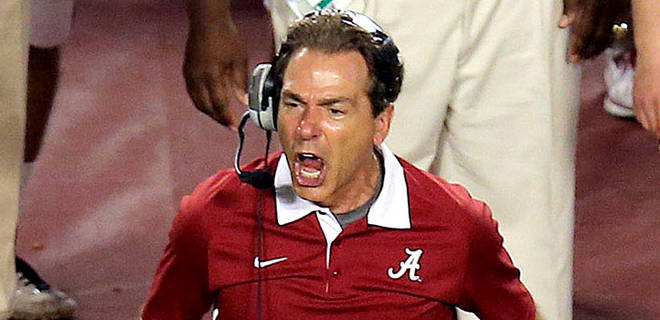Jimbo Fisher and Nick Saban are two of the best coaches in college football, and their paychecks reflect that. Each has won a national championship in the last three years. Both their teams made the inaugural College Football Playoff last season. You’d think both would be pretty content with where the sport is right now.
Last week, however, both expressed concerns about the changing nature of the game, following the advent of the playoff.
“I learned what I feared the most would happen,” Saban said before teeing off Wednesday at the Regions Tradition pro-am in Birmingham. “All the attention, all the interest would be about the four teams in the playoffs, which is exactly what happened, which was great to be a part of.
“But what I was most fearful of is college football is unique. A lot of young men get a lot of positive self gratification from being able to go to a bowl game and that’s always been a special thing. That by having a playoff we would minimize the interest in other bowl games, which I think is sort of what happened and I hate to see that for college football.”
“I’m worried winning the Orange Bowl doesn’t mean anything. When I was a kid … we still had a national champion but [the other bowls] still mattered. Now if you go 12-2 and win an Orange Bowl or Sugar Bowl or Cotton Bowl or Chick-fil-A Peach Bowl and you say that’s not enough? There’s something wrong with that now,” Fisher said. “When you’re 12-2 there’s not much better you can do. You might get over the hump [to the playoffs] but how many times?”
Although they were talking in the context of the bowls, both hit on a broader issue for the sport.
Historically, college football has been all about the regular season, which played well with the regional logic of the sport. Winning a conference championship was a big deal. Rivalry games were a big deal. Traditions were a big deal.
It wasn’t intentional, but the postseason structure contributed to that. There was no Super Bowl waiting at the end of the year to run roughshod over the national conversation.
That started to change some with the advent of the Bowl Coalition in 1992 and its later mutations, the Bowl Alliance and BCS. More focus shifted to the postseason, as the BCS chase became the major story that tied the entire season together.
Given how the playoff monopolized the national conversation this year, the sport has crossed a rubicon. It altered the entire way the season was viewed for every team.
When Ohio State shellacked Wisconsin in the Big Ten Championship Game this year, it was deemed important because it raised the possibility of OSU leapfrogging Baylor and TCU into the final four. Back in the day, something like that would’ve been a big deal because Ohio State, ya know, won the Big Ten.
At this point, it’s not a matter of which way of doing things is superior. Apparently, everyone in charge is happy with television ratings being through the roof and all. (Never mind that people are losing interest in making the effort to actually get to a game.) Now that the playoff genie is out of the bottle, it won’t get pushed back in.
But it has transformed the sport forever. Those changes rarely come without a trade-off. Overall, I expect there will be less celebrating of teams’ accomplishments and more grumbling about disappointment.
